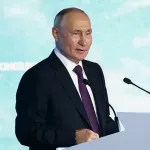
Key Points
First sitting president detained in South Korean history
Arrested over martial law declaration and abuse of power
Intense standoff between investigators and presidential security
Unprecedented political crisis unfolding in South Korea
A warrant to detain Yoon was executed at 10:33 a.m., according to the Corruption Investigation Office for High-ranking Officials (CIO), marking the first time a sitting president has been arrested, Yonhap news agency reported.
A convoy of vehicles carrying Yoon left the presidential residence compound in central Seoul shortly afterward to head to the CIO office in Gwacheon, just south of Seoul.
Yoon was seen stepping out of a car and entering the office to undergo questioning before investigators seek a warrant to formally arrest him within 48 hours.
Yoon, who is suspended from duty following his impeachment by the National Assembly on December 14, faces charges of insurrection and abuse of power.
He is accused of sending troops to the National Assembly after declaring martial law on the night of December 3 to stop lawmakers from voting down the decree.
Yoon is expected to be held at the Seoul Detention Center in Uiwang, near the CIO's office, following questioning.
The president has defended his declaration of martial law as an "act of governance" meant to send a warning to the main opposition Democratic Party over what he described as its abuse of legislative power.
In a recorded video message released after his arrest, Yoon remained defiant, saying, "Although it is an illegal investigation, I decided to agree to appear at the CIO in order to prevent ugly bloodshed."
The arrest followed hours of talks between investigators and Yoon's side at his residence over how to detain him and take him away for questioning.
"At this point, we are not considering his voluntary appearance and our aim is to execute the warrant," a CIO official told reporters earlier.
"Unlike during the first attempt, there were no personnel or Presidential Security Service (PSS) staff actively resisting the execution," the official added. "There were practically no physical clashes today."
Investigators used ladders to enter the presidential residence compound in central Seoul after being blocked by the PSS, which set up a barricade using vehicles near the entrance. They were also blocked by a group of lawmakers from the ruling People Power Party and Yoon's lawyers at the entrance.
Some investigators appeared to attempt to secure access to the compound through a nearby hiking trail.
"This is not a just enforcement of the law," Yun Gap-geun, one of the lawyers, said, calling the investigators' attempt "illegal."
Police deployed some 3,000 personnel to secure access to the compound, with physical clashes taking place between investigators and Yoon's supporters. Fire authorities arrived at the scene to treat a middle-aged woman on the ground.
Investigators failed to detain Yoon earlier this month after an hourslong standoff with his security staff at the residence.
The Seoul Western District Court issued warrants to search the presidential residence and detain Yoon after he snubbed three summonses from investigators to appear for questioning.
The warrants, which were granted extensions last week after they expired, were valid until January 21.
Leave a Comment
Thank you! Your comment has been submitted successfully.






